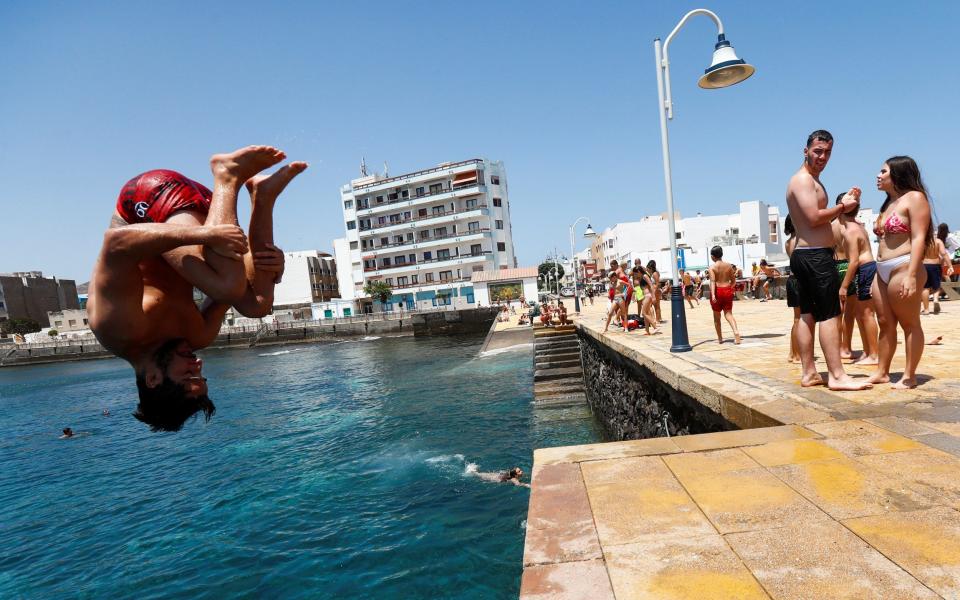Warm weather may help Europe avoid second wave of coronavirus - for now


High temperatures and good weather have so far protected countries from a second wave of coronavirus that would lead to thousands of deaths, it is thought.
With mounting evidence that the virus does not spread so effectively between people outdoors as inside crowded buildings, scientists are now pointing to recent weather as helping flatten the curve of the pandemic.
But fears remain that a second deadly wave could hit after the summer, as temperatures fall and seasonal infectious disease, such as flu, take off again.
Europe in particular has for now avoided a renewed surge in Covid-19, despite having started to lift previously tough restrictions on work, schools and social interaction.
Several countries ahead of the UK on the road out of lockdown have seen local spikes, but have maintained an overall downward trend in new daily cases.
Experts say this is partly due to the weather, with the continent recording its hottest winter on record followed by a warm and sunny spring.
However Professor Francois Balloux, Chair in Computational Biology at University College, who has examined the progress of the pandemic in Switzerland and Denmark, warned of a potential seasonal return of the virus.
Neither country has seen a rise in cases since lockdown measures began to ease, with schools and restaurants reopening in Switzerland on May 11.
Prof Balloux has written: “Why did the epidemic not resume? Denmark has slowly and gradually relaxed its lockdown measures from 15 April on. There isn't any evidence for an increase in the number of cases since either.”
He points out that “other endemic coronaviruses causing 'common colds' are highly seasonal with a marked peak in winter” and concludes: “If SARSCoV2 transmission were similarly seasonal the Covid-19 epidemic may be slowed by the current summer weather.”
Prof Balloux said that what he called residual social distancing - the continued adherence by people to measures such as face masks and keeping apart from others - was not enough on its own to explain the lack of a second wave.
He concludes that 'seasonality' combined with 'residual social distancing' are both likely to have “contributed to the lack of resurgence of #COVID19 after the easing of lockdowns”.
Professor David Alexander, of the Institute for Risk & Disaster Reduction at UCL, told The Telegraph the seasonality of coronavirus could be a key factor.
“There’s a consensus that a second wave is likely, perhaps in the autumn,” he said. “The reason we’ve not had a second wave yet in those countries that have eased restrictions may have something to do with the weather. This does seem to be a bit of a cold weather virus.”
But Prof Alexander said continued caution by people coming out of lockdown may have also helped keep the virus at bay, combined with rapid response by local authorities in suppressing localised spikes in countries such as Italy.
“This is a beast of a disease and flare ups will happen, because one individual can spread it widely. Localised spikes also depend on what people’s behaviour is actually like in terms of continued social distancing. At the moment people remain very cautious because they are so worried,” he said.
Dr Gianluca Pescaroli, an expert in organisational resilience at UCL, said countries had to make use of the seasonal respite to prepare for a second wave.
And he warned that while people were being cautious now, they may soon begin to abandon social distancing and return to previous habits.
“If we are not careful it may come back sooner than autumn,” he said. “We need to both use this moment to reinforce the messages about responsible behaviour and improve the way we respond to the next wave in order to mitigate its impact.”
The German government's chief scientific advisor on the coronavirus crisis, Christian Drosten, also warned that summer temperatures may simply be providing some temporary respite from the virus.
"It’s relatively clear that there is a certain temperature effect. It probably arises from being together in closed rooms in winter,” he said. “The big question is: will it [the virus] be more virulent? Or is it weakening?”
Prof Drosten said it is now understood the virus is passed on mainly by "superspreaders", not by uniform infection and that this makes it easier to stop through track and tracing and isolating contacts of those infected.
“There is a theoretical possibility that we can get through without a second wave,” he said. “We have a few people who infect many others. That sort of infection is easier to control than one that spread uniformly under the radar. If you notice where an outbreak is brewing, you have to hit it hard.”

 Yahoo News
Yahoo News 